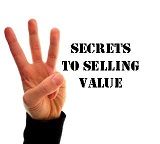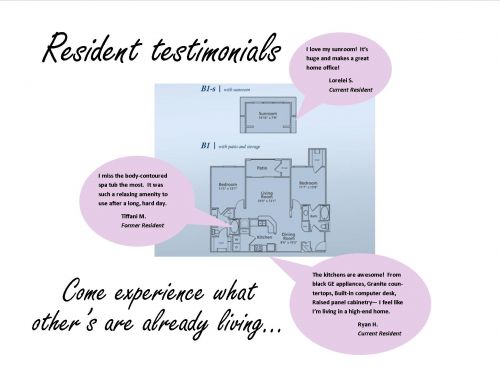Multifamily Blogs
3 Secrets to Selling Value
3 Secrets to Selling Value
 “A fool is someone who knows the price of everything but the value of nothing.” -Oscar Wilde
“A fool is someone who knows the price of everything but the value of nothing.” -Oscar Wilde
We live in a world that seems to focus on price— not value. Price is only one factor in a buying decision. What we often don’t realize is that we make value-based buying decisions every day. We buy our clothes, cars and food based on the perceived value that we get from what we purchase.
A recent Harvard University study revealed that buyers want more than a “cheap price”. In fact, only 1 out of 6 buyers are true price shoppers. The study also showed that most price objections that salespeople encounter are self-inflicted; meaning salespeople are more concerned about price than customers. In fact, buyers rated price 7.2 (on a 10-point scale), while salespeople rated it price 8.3. Who’s making the bigger deal about the selling price?
As a true sales professional, it is your job to determine what the prospect values. Sometimes, higher prices can actually be considered a selling advantage. A higher cost creates a perception of higher quality or a "cut above". Top Leasing Professionals welcome a price difference because it gives them an opportunity to demonstrate how good their product is and how great they really are!
Leasing professionals who employ value-added selling techniques sell 3 things:
Themselves
Living is selling.
Start from childhood and remember all the sales you made. You worked up a sales pitch to get your parents to raise your allowance, buy you a nicer bike, extend your curfew, and so on.
Life is a constant sale. And the path to success for both living and selling is the same. Inexperienced salespeople invariably start their pitches with the price and the product, and then talk about the company. Only at the end, and perhaps not even then, do they finally sell themselves.
People value, and pay more for, the way you make them feel. People buy emotions.
Their Product
Knowledge is power.
Knowing your product from the inside-out is an important first step in communicating the Product Knowledge you have of your community. When I was out in the field leasing with a traveling leasing company, I was given 2 days to learn the community before I started leasing. I was able to do this a number of ways:
First, I completed a 22-page Product Knowledge Workbook that was so intensive that I had to measure windows, find out the closest place to get a money order, and calculate average costs of utilities— just to name a few. This allowed me to get to know my community intimately and look like I had been there forever. When you have extensive knowledge of your community, it helps you learn what features and amenities are important to your prospect. Use these to sell the value of your community.
Second, I created 50 to 100 fabulous reasons to live at the community with the most descriptive and unique language I could come up with to make my community stand out from the competition. Have you ever shopped a community, only to hear the Leasing Professional sound “listy” in describing their community? This may be an old-school technique, but I still find it to be a very useful tool to use while painting a picture for the prospect and white rabbiting over the phone (and it helps keep you from sounding “listy”!).
Third, to have confidence in yourself and what you are selling you need to FALL IN LOVE with your product. I leased at some of the most outdated apartment communities (some still had the original 70’s shag carpeting), but by the time I was finished with my 48-hour Express (the 2 days I was given to learn my community) I had fallen in love with what I was selling.
Their Company
Be passionate about who you work for and show that enthusiasm to your prospects.
In college I used to work for S & K Menswear, selling suits. We were REQUIRED to tell the S & K story with every customer. C’mon, I worked at an OUTLET MALL close to the GA-FL state line— do you really think traveler’s appreciated my story?
So, I’m not going to suggest that you tell your company’s story and share their history because, frankly, your prospect doesn’t really care about that.
What they DO care about in this day and age are testimonials. You can tell a lot about a company who monitors and responds to the reviews (both good and bad) left by residents on Apartmentratings.com. One way to monitor your company’s reputation is by using Google Alerts, a free online tool that will track mentions of your community and/or company.
I recently did a webinar with Lisa Trosien and she included an idea to print your own testimonials directly on your floor plans. I simply copied and pasted this floor plan from the community website and added the thought boxes and text in MS Publisher. Share your testimonials with prospects about how happy your residents are with your company and community.

Selling on value is a mindset. It starts with your self-concept. Begin to see yourself as a value-adder. Gain a thorough understanding of what makes your community unique and how you’re better than your competition.
Be proud of your price and avoid becoming part of the price problem. Sell the value added benefits such as superior maintenance staff, amenities and your company (don’t forget yourself!).
Becoming a value-centered sales professional doesn’t happen overnight. It requires a change in philosophy and approach. As you begin to see yourself as a value-centered Leasing Specialist, make it your goal to become a strategic thinker and to learn what your prospect values.

